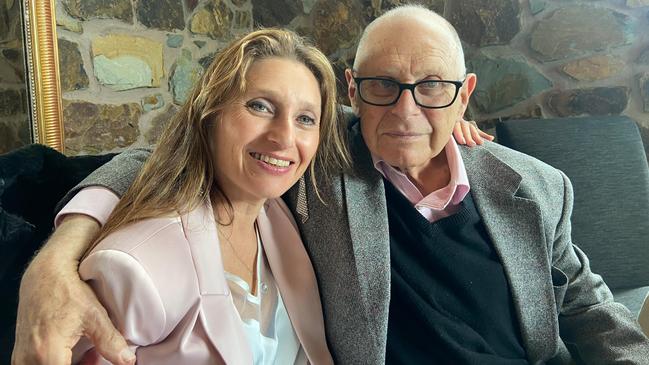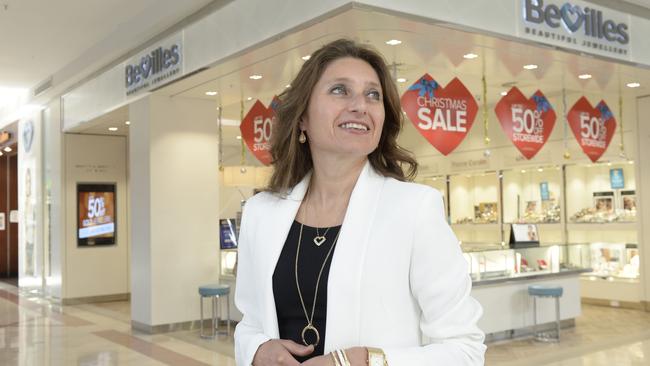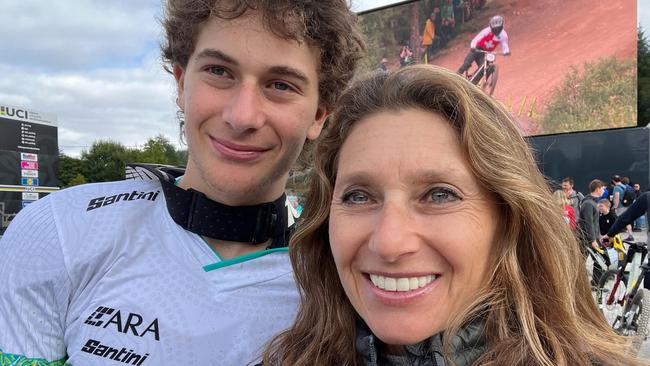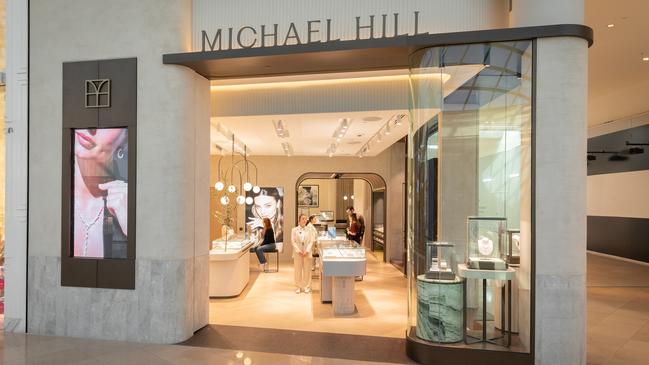From heartache to jubilation: How Michelle Stanton saved 90-year-old jewellery icon Bevilles
When insolvency documents were delayed by a printing glitch, Michelle Stanton decided Bevilles, the jewellery chain started by her grandparents in Melbourne in 1934, was worth fighting for. Last year she sold it for $45m.

Michelle Stanton says it felt like attending a wake.
She is speaking about a fateful Wednesday evening in early 2014 when she, her family and their finance boss gathered on the 54th floor of a Melbourne office tower to hand over the keys of their jewellery and homewares business to an insolvency firm.
Bevilles, the business her grandparents had founded in 1934 that grew to be one of Melbourne’s top jewellers, had fallen victim to a tough retail environment and hard bargaining from its landlords.
“We were sharing stories, we were crying and laughing. When it is the death of something that you love, as a family you are acknowledging the moment,” she now recalls.
But there was a last minute hitch. The printer in the insolvency firm’s office wasn’t working, so the documents could not be signed. Everyone was asked to return at 8am the next morning to complete the paperwork.
Later that night, after consulting with their financial advisers and lawyers, the family resolved to fight on. The documents were never signed.
Stanton – who was CEO of the business at the time and known by her maiden surname, Beville – was given the blessing by her parents and brother to “Go save our baby”.
The rescue plan, which the family had first hatched in November 2013 but needed more time to complete, was dubbed: “The huddle around to save Bevilles”.
Its central element was cutting back the less-profitable giftware sections of the stores and instead to specialise in jewellery, diamonds and watches.
History shows that Bevilles did eventually enter voluntary administration in April 2014, but not at the hands of the insolvency firm which was almost handed the keys that February.
The family quickly put in an offer for a restructured business to the administrator, PPB Advisory, and bought 16 of its 27 stores out of administration, saving just over half the jobs in a remarkable rescue plan which was executed at lightning speed.
“We saved more than 250 jobs and paid all the suppliers. The trust we had built up over 80 years came to the fore,” Stanton says proudly.
Over the next nine years the focus on diamonds – all hand picked and with internationally recognised certification – reaped rewards.
In April last year Bevilles was sold to the ASX-listed Michael Hill International jewellery group for $45m, ending nearly 90 years and three generations of ownership by the Beville family.
Michelle Stanton’s life story of survival and success – until now untold – is a remarkable one.
She is “proud and grateful” that the Bevilles name lives on in business.
“Because I think when you have been in that place of 2014 … At the time for us it was such a nightmare, not only as a family, but also for the brand,” she says.
“I decided in myself that I wasn’t going to be the person who was going to take Bevilles to 100 stores plus. Bevilles always needed to go there.
“I had the realisation that I didn’t want that for me, but I wanted it for the brand … I felt like I was a custodian for the brand in my 30 years of taking care of it.
To see it go, to fly, to end up in New Zealand, Canada and all around Australia, that was my dream for it.”
Strength from overcoming inner demon
Stanton grew up with jewellery and homewares in her blood. At the age of four, she wanted to be on the shop floor.
Bevilles was opened in 1934 – the year her father was born – in Melbourne’s Bourke St. Leo Beville and wife Rae’s business traded as a homewares retailer selling products such as blankets, chests, chandeliers, saucepans and dinner sets.
Jewellery was added to the product line in the 1950s.
In the late 1970s Leo’s son, Keith, and wife Deirdre expanded the business while their children attended primary and secondary school.
At the age of 20 in 1988 Stanton enrolled in a marketing and psychology degree at Monash University. While all appeared normal on the outside, internally she was consumed with self-doubt.
The next three years would prove to be the most challenging of her personal life as she battled bulimia, a serious eating disorder and complex mental health condition.
She didn’t tell her parents because she did not want them to feel responsible.
While she stresses her condition was never life threatening, it was obsessive – three times a day, every day, for three years.
“One day I was sitting next to someone who was very ill at the time with anorexia. She said to me, ‘You’ll never get over it.’ I literally just stood up and said to myself ‘That is not going to be my life’ and I walked out,’ she says.
She immediately sought help to learn to “love herself again” and started on the road to recovery.
“There is a way through once you make a decision and learn techniques to reframe your thinking. Because it’s all coming from your thinking,” she says.

“It’s got nothing to do with body, food, alcohol or whatever that addiction might be. Once you learn the techniques of reframing your thinking, thriving is possible for everyone.”
The experience made her more sympathetic to people suffering from difficult circumstances and conditions. It also prepared her for the tsunami in her business life that was to come.
After graduating from university and spending some time travelling, she joined her father and brother Gary at Bevilles in 1991. They all worked together for the next decade. Her older sister had never joined the business.
Times in retail were tough and the business experienced some major challenges. Stanton eventually sensed her father was getting tired of running it on his own.
In 2008, as the global financial crisis was taking hold, Bevilles appointed an external adviser to help future-proof the business.
He ran a process under which Stanton, who was then pregnant with her second child, was anointed by her father and brother to be CEO.
When her daughter was born, she returned to work after just two weeks. She took her newborn, named Chilli, and her then three-year-old son Jed, to the office most days.
They even went to meetings with Bevilles’ bank manager.
Her husband, Jamie, eventually became a stay-at-home dad to support her with the children.
As chief executive Stanton oversaw Bevilles’ expansion to 27 stores by 2014. But she always felt like an impostor in the top job.
“From 2009 to 2014, there was quite a lot of fear. We were trying to find a way through. We were the leading jeweller in the shopping centre but we were losing money. We couldn’t turn it around,” she says.
“

The family were always united in the endeavour – I always had the support of my dad and brother. But when you can see things slipping, it is a very challenging time for anyone.
“My worst nightmare was happening. I felt like a fraud and the evidence was starting to show that.”
In November 2012 Bevilles’ bankers gave her 90 days to come up with $5m to repay a loan. Fortunately an investor came to the rescue and took a share of the business in exchange for making the payment.
The next morning, it all became too much for Stanton.
She recalls walking into her bedroom dressing room in her pyjamas and falling to the ground – emotionally collapsing under the weight of stress.
Her son, who was then in grade seven, walked in to see his mother in tears on the floor. He had never before seen her cry. He bent down and asked what was wrong.
“I told him that I was going to probably lose the business and lots of people are going to lose their jobs,” she recalls.
But at that moment, as she looked into her son’s eyes, a change came over her. It was the same feeling she experienced more than two decades earlier when the woman with anorexia told her she would be bulimic for life.
“In that moment the lioness literally rose up to roar,” she smiles.
“Eye to eye with my son, I said ‘Sweetie, this is not going to be my story. It is not going to be the story you are going to tell about your mum for the rest of your life, that I was the one who lost the family business’.
“That moment was life changing. I just made a decision that I was going to find a way.”
A year later, she did.
Time to move forward
While the Beville family’s rescue plan brought the business out of administration in 2014, the staff were still fearful.
Millions of dollars were needed to repay creditors and refurbish the remaining stores.
By 2017, the business was still struggling.
With her brother’s blessing, Stanton visited America to study the transformation of the mind. Morning and night she studied leadership.
“I discovered a system of how to transform my thinking that predictably changes results and that’s what I applied to the business and my life, and it created extraordinary results,” she says.
“We went to a place of gratitude for what we had, rather than a place of fear and I got my team to think differently. We created a culture of staff so excited to make a difference in their customers’ lives.”
In 2019 she resolved to – as she puts it – “find the freedom for Bevilles to be without me and me to be without Bevilles”.
Michael Hill would be her dream buyer and in April 2023 it became reality.
The first words from her parents the day the sale was completed were simple: “We are so proud of you.”
Today 55-year-old Stanton is still an ambassador for Bevilles, which is again battling lower consumer discretionary spending on fine jewellery and was a drag on Michael Hill’s first-half results.
She also has her own life-coaching business called Complete Success and is raising two teenagers excelling in downhill mountain biking and snowboarding.
She feels a responsibility to do good with the wealth her family has generated, and is the founding partner of Life-Changer, a preventive mental health and wellbeing not-for-profit business.
Her parents, now in their late 80s, are in good health and travelling the world.

Keith Beville has survived a cancer scare he lived through in 2021 when, at the height of the Covid-19 pandemic, the family used to catch up on nightly Zoom calls.
His daughter recalls that she and her siblings decided to use the virtual calls one week in July 2021 to record their parents’ remarkable story.
“I created five themes for the five nights. One was about their childhood, one about Bevilles, one about their charity work, one about their travels,” she says.
“And on the last night, I asked them what was the most difficult time of their life. Without question, they said the 2014 restructure.”
For a moment she pauses to wipe away tears.
“Reflecting upon that moment now, I get teary because I was like, ‘Oh, my God, I brought upon them the hardest time of their life’,” she says.
“And now my dad was facing cancer. In that moment I thought, ‘Right, this (sale) has got to happen. I’ve got to make the most proudest moments for them and I really wanted to do it while they were alive.
“I was blessed. Not everyone gets that chance to make something right, that wasn’t right, with their family.”




To join the conversation, please log in. Don't have an account? Register
Join the conversation, you are commenting as Logout